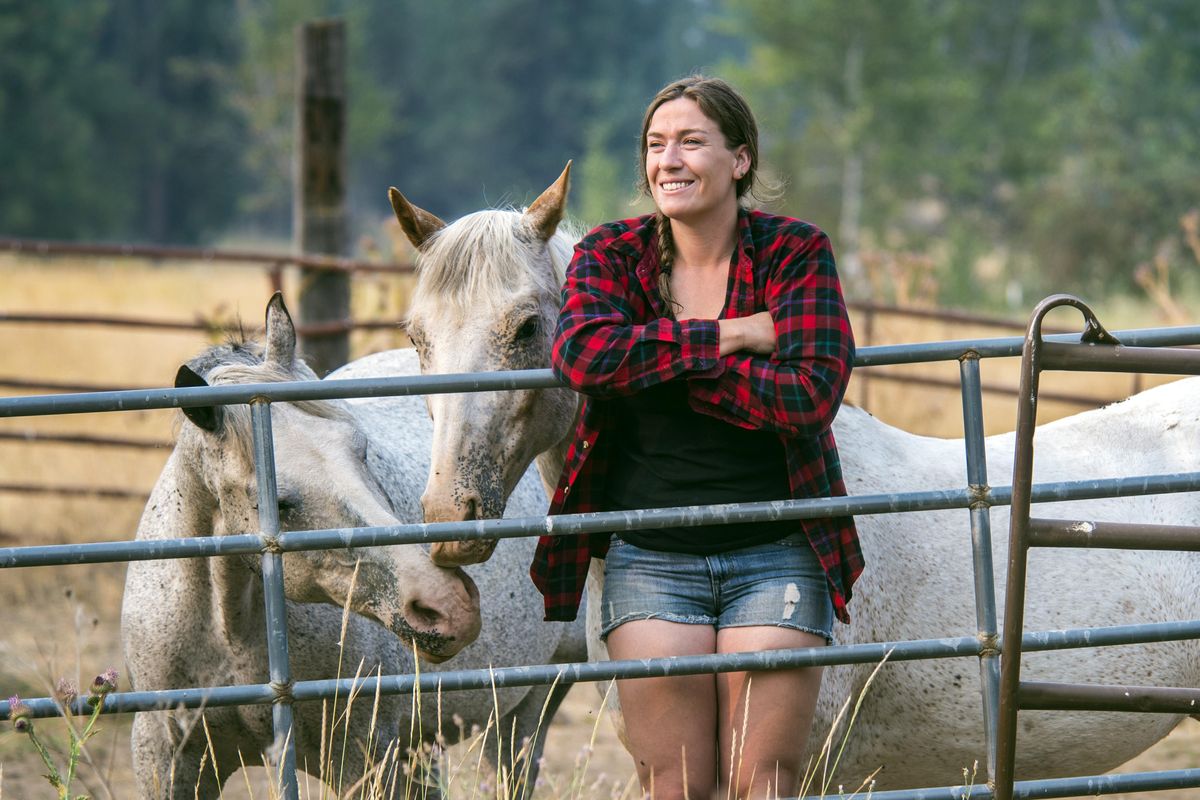‘Cowgirl Camp’ to emphasize role of women in agriculture

Beth Robinette walked in among her cattle, leaned forward and mooed. A low, guttural “How are you all doing this morning?” kind of moo. All around her, black cows lifted their heads and, one at a time, they mooed back.
“It’s funny, isn’t it?” Robinette said, standing in the pasture that’s been grazed by her family’s cattle for three generations. “They always respond.”
Stirring, her herd of black Angus roused themselves and meandered slowly, bellies swinging, toward another pasture where a trampled path meandered downhill toward a lake.
“Cows are sort of like water: Once one of them gets going, they all sort of follow that same way,” Robinette said, watching her herd walk off.
Robinette, a third-generation farmer, is putting on a five-day New Cowgirl Camp starting Aug. 28. The camp is based at her family’s Lazy R Ranch outside Cheney and she’s doing the camp together with veterinarian and ranch owner Sandra Matheson.
Both Matheson and Robinette are accredited holistic management professionals and the focus of the camp is on how to manage grassland and cattle using regenerative management methods.
The Cowgirl Camp, which is sponsored by Roots of Resilience, a nonprofit that promotes restoration of grasslands in the Pacific Northwest using holistic management methods, will teach participants basic farm skills and low-stress animal handling techniques.
Robinette said her dad discovered the work of Allan Savory, a Zimbabwean wildlife biologist, in the mid-1990s. Savory has long contended that reintroducing cattle and goats to desertified grassland actually helps the grass recover, if the grazing is managed correctly.
“You have to move the animals around the landscape in a way that mimics herds in nature,” Robinette said. “The grass needs the cows to be healthy.”
Savory founded the Savory Institute, a nonprofit organization that promotes his grassland preservation methods via 40 hubs all over the world.
“I was 8 or something when my dad started doing this,” Robinette said. She has a grass plant tattoo on one leg and calls herself an agriculture geek. “I was indoctrinated at an early age.”
The idea for the cowgirl camp came from a desire to share the holistic ranching methods she grew up with, and to put a stronger focus on women in agriculture.
In 2012, the United States Department of Agriculture estimated that women farmers controlled 7 percent of farmland, accounting for 3 percent of sales. The same year, 14 percent of the nation’s 2.1 million farms had a female principal operator.
“Women have always done a lot of ranch work, but they are vastly underrepresented,” Robinette said, adding that she hopes this will be the first of many camps and that future camps will include men.
Regenerative ranching requires exceptionally well-kept records and continuous ecological monitoring, Robinette said, all skills that will be taught at the camp.
When practiced right, Robinette said the regenerative methods allow for more cattle on the same piece of land.
“It works. People may look at you a little funny first, but it works,” Robinette said.
While embraced in some circles, Savory’s methods have many critics. An assessment of research studies, published by the United States Department of Agriculture, found little evidence that trampling by cattle enhances soil quality.
One of the articles’ authors was David Briske, a professor in the Department of Ecosystem Science and Management at Texas A&M University. In his paper, Briske and his co-authors wrote that Savory’s rotational gazing methods may work, “but scientific experiments have demonstrated that they do not necessarily work for specific ecological purposes.”
Robinette said she understands why some people are skeptical, but she hopes local ranchers will be open to a different way of doing things. She said she knows it’s especially tough for some farmers who feel bound by tradition – and worry they risk everything if they try new methods.
“We have had so many destructive agriculture practices, we have to get ahead of the destruction of grassland,” Robinette said.